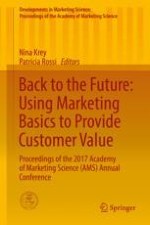2018 | OriginalPaper | Buchkapitel
Purchase Quantity Restrictions: Good or Bad? An Abstract
verfasst von : Siddharth Bhatt, Srinivasan Swaminathan, Rajneesh Suri
Erschienen in: Back to the Future: Using Marketing Basics to Provide Customer Value
Aktivieren Sie unsere intelligente Suche, um passende Fachinhalte oder Patente zu finden.
Wählen Sie Textabschnitte aus um mit Künstlicher Intelligenz passenden Patente zu finden. powered by
Markieren Sie Textabschnitte, um KI-gestützt weitere passende Inhalte zu finden. powered by
